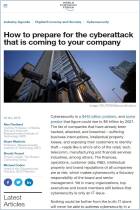How do you protect a small business, a corporation, a nation? Guard secrets, stay ahead of the competition and, if you’re a nation, prepare to defend your country by land, sea and air. But what about cybersecurity? In 2016, NATO identified cybersecurity as the next theater for modern warfare, urging member countries to cooperate in fighting and recovering from cyber threats. Geopolitical cyberattacks aren’t only directed at government entities, however. Private service providers are also under attack. This report from the Boston Consulting Group outlines cybersecurity measures vital to every organization.
Geopolitically motivated cyberattacks are on the rise, making cybersecurity an increasingly vital part of any organization.
Geopolitical cyberattacks are becoming more common, and government entities aren’t the only targets. Instead, private companies, networks and infrastructure are at risk – even water systems and hospitals. It’s difficult to determine who the culprit is, and it’s often not clear where organized crime ends and cyberattack surrogates, paid by nation-states, begin. The nature of cyberattacks has also changed – a wider variety of motivations prompt attacks, with more diverse targets and more damaging effects. Some attacks seem to be specifically targeted at undermining society.
The more spread out a company’s workforce, the more vulnerable that company is to cyberattacks. So when the COVID-19 pandemic made remote work more common, hackers took notice.
In the new world of cyberattacks, hackers are more sophisticated, money or data theft aren’t the only goals, and everyone is vulnerable, even small...
























Comment on this summary or Start Discussion